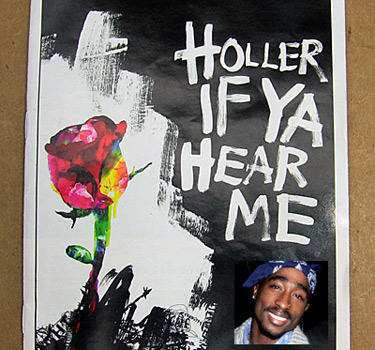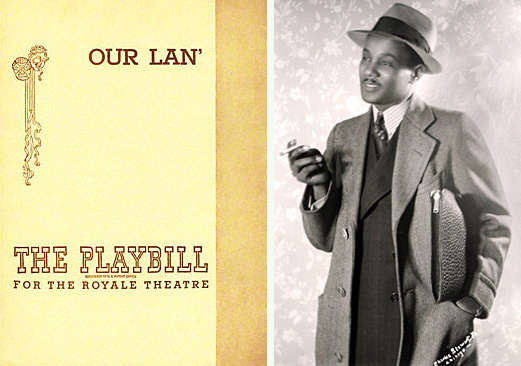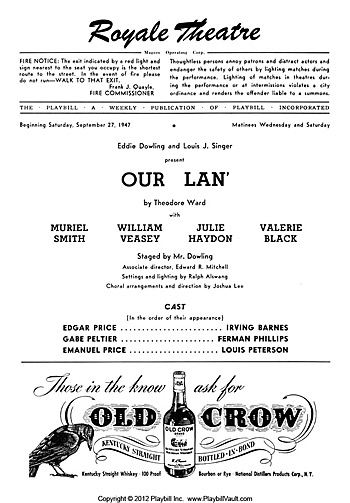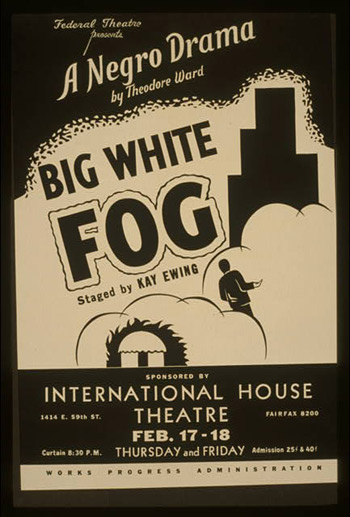The new Broadway musical featuring the words of Tupac Shakur is a far cry from what New York theater is accustomed to seeing. Maybe that’s why so many seats were empty Sunday at the matinee of “Holler If Ya Hear Me” at the Palace Theater.
I went with friends to see how well the rap star’s raw poetry had been transformed into a musical whose poster sported an almost-abstract red rose (modeled after one of his songs). I know very few of Tupac’s lyrics, but I do know his style – and it’s not exactly the Great White Way. I remember him more as an actor, especially in “Poetic Justice (1993),” one of the few movies he made before he was tragically killed at age 25 in 1996.
Tupac’s words are not accessible to everyone, especially the crowd you’d normally expect to see at Broadway musicals. It’s much too gritty, too much in your face, too realistic and too angry – not the smooth sounds of love you hear in the nostalgic Motown The Musical that is still filling seats about a block away. Holler took a 15-year route to the stage, and has gotten mixed reviews.
At nearly two hours long, Holler, though, is worth a trip to New York to see the play.

This is not a show about Tupac’s life (which would have made a better story); the plot is entirely original, with a theme on the ills of street violence. His words were beautifully rapped and sung, but liberally peppered with profanity and the N-word. Saul Williams, considered the lead actor according to most accounts, screamed and spat them out as more a dare than a recitation. He was juxtaposed with Christopher Jackson, who for me was just as much the lead actor but much more mellow. They seemed to be sharing the role.
This musical was a try at something new for Broadway. The producers and writer were not much unlike others who have tried to shake up Broadway’s comfortable repertoire.
I found such a playwright a day before I went to see Holler. I was going through some ephemera I had bought some years ago and came across an October 1947 issue of Theater Arts magazine. How fortuitous, I thought.

I wondered if there would be any mention of African Americans, since this was 1947. I flipped through the first page and then the second: Helen Hayes was playing in Rodgers and Hammerstein’s “Happy Birthday” and Ethel Merman was in the team’s “Annie Get Your Gun.”
To my surprise, I saw an upcoming play whose description included the word “Negroes:”
“‘Our Lan’, Theodore Ward’s play of Negroes under Emancipation, first produced at the Henry Street Playhouse (Dowling-Singer).”
I had never heard of this playwright, so I was obviously intrigued.
Theodore Ward was born in 1902 and started writing at an early age, although his father did not approve. Around the age of 12, he left home, did a number of odd jobs in other cities, and found his way to Utah, where he got into an extension program at the University of Utah based on his writings. A professor encouraged him to apply for a fellowship to the University of Wisconsin, which he got.

Once the one-year fellowship was over, he headed to Chicago and found work in one of the “Negro Units” of the Federal Theater Project (FTP), which supplied funding for theater performances. Ward began as an actor in the program and continued writing. In 1937, he wrote a one-act play titled “Sick and Tired (Tihad)” that won second place in a Chicago Repertory Company contest. He was encouraged by writer Richard Wright to continue writing plays.
The result was “Big White Fog” in 1938, which was produced by the FTP. Buoyed by the success of the play , Ward decided to try out New York, arriving there as an actor in the chorus of “The Swing Mikado,” another FTP play. Fog opened Off Broadway in 1940 at Harlem’s Lincoln Theater, and was produced by the Negro Playwrights Company, of which Ward was a co-founder along with Wright, Langston Hughes, Paul Robeson and others.
Back in Chicago during World War II and working odd jobs again, Ward wrote “Our Lan’.” The play premiered at the Henry Street Settlement Playhouse in 1947 before heading to Broadway at the Royale Theater (now the Bernard Jacobs Theater) in September of that year. Produced by Eddie Dowling & Louis J. Singer, it stayed for 42 performances; although its run was short, it was said to be one of the few plays by African Americans on Broadway since the 1920s.

Ward was awarded a Guggenheim Fellowship in 1949, which gave him the resources to write a play about the abolitionist John Brown. His career never did take off, and he was blacklisted during the McCarthy era because of his so-called leftist leanings. He died in 1983.
Ward wrote more than 30 plays. His works seemed to be both complimentary and controversial, taking on such issues as “Garveyism, anti-Semitism, color prejudice among blacks, the devastating effects of racism, the appeal of Communism, and the failures of the United States Government to live up to its responsibilities to African Americans.”
He appeared to be a talented playwright, but his name and his place in theatrical history have been forgotten.
“Our Lan'” (here’s a Playbill) held to his themes but apparently even more. It is the story of a community of African Americans who are trying to figure out where they fit in this new era of Reconstruction after settling on an island off the coast of Georgia. Ward apparently wanted to show African Americans in their complexity.
He wrote a play devoid of “spirituals and hot dancing, which are the only two things Broadway knows about Negro Theater,” the New York Times critic wrote at the time. A Time magazine review didn’t seem to treat it so kindly.
